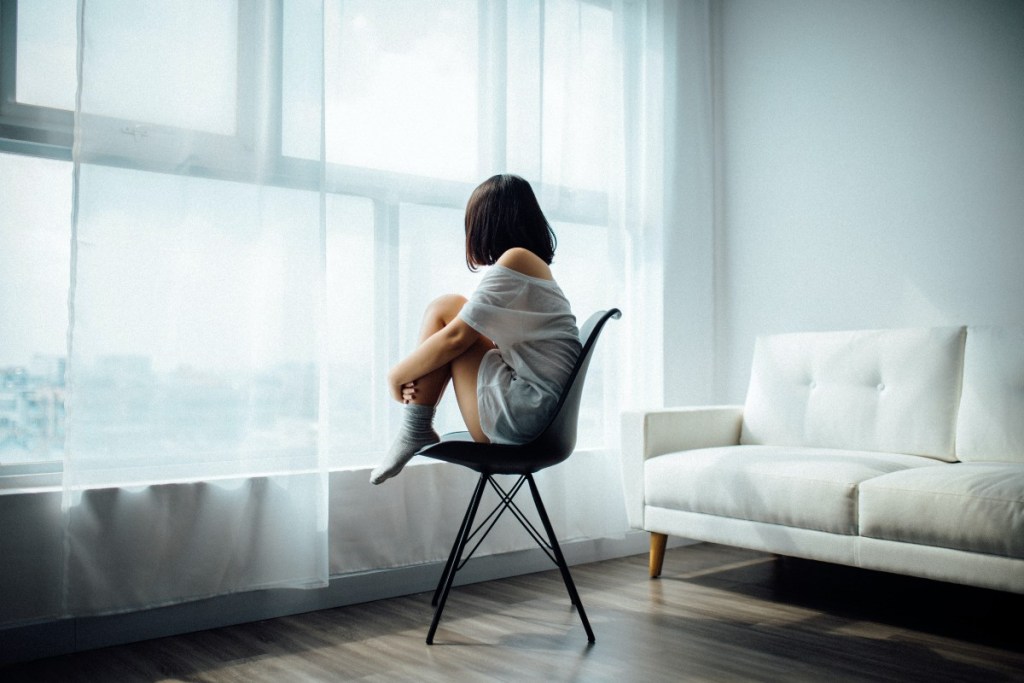For some, a return to normal is something they’ve been waiting for since the pandemic started in March 2020. It’s a chance to — finally — hug their grandparents, go out to eat with friends, and take a mask-free morning walk.
Others may experience anxiety about the reopening of society post-pandemic. It’s important to know these feelings are normal.
“For more than a year, we have been told that we are protected by isolating, and so the idea of things reopening removes the protection that we all had,” says Dr. Yasmine Saad, the founder, CEO, and a senior licensed clinical psychologist at Madison Park Psych in New York, N.Y.
It’s okay to go at your own pace, but you also don’t have to live in isolation forever. Experts shared ways to cope with post-pandemic stress.

Assess your feelings
Validate your anxiety
Dr. Saad believes the first step to moving forward is acknowledging — not ignoring — your anxiety about reopening post-pandemic.
“Look within, [and] ask yourself, ‘What am I anxious about?’” she suggests.
Look at the context
For more than a year, ordering groceries online because of COVID-19 fears was considered reasonable, as were Zoom birthday celebrations. However, with infection rates declining and vaccinations picking up, that’s not necessarily the case anymore. Still, you may not feel safe going to a party with unvaccinated individuals, even if you are vaccinated.
It may be helpful to take a step back and ask whether your fears fit the current context of the pandemic. Doing this can also help you communicate with others who may not understand why you’re nervous. Also, remember: Even if your fears and actions no longer fit the context, you’re always allowed to say “no.”
“Acknowledge whether it’s rational or not,” Dr. Saad says. “If it is rational, provide the reasoning. If it’s not, laugh at your anxiety, but ask others to respect where you are mentally.”
Take action to relieve post-pandemic stress
Get vaccinated
The Centers for Disease Control says vaccines are safe, effective, and the best way to protect yourself against COVID-19.
“To mitigate risks, the first thing everyone can do is get vaccinated,” says Mimi Winsberg, MD, the Chief Medical Officer at Brightside Medical, San Francisco, Calif. “Vaccinations are offering fantastic protection against the virus and significantly reduce your ability to transmit the virus.”

Go slow
You don’t have to race out to a packed baseball stadium or live concert tomorrow if you’ve been ordering groceries online for the last year.
“Taking things one day at a time and gradually increasing your range is a good approach to those adjusting to new risks and activities: start low, and go slow,” Dr. Winsberg says.
For example, you might try going grocery shopping with a mask on or having one other vaccinated individual over for an outdoor gathering and then gradually work your way up from there.
Practice mindfulness
You may have a million thoughts running through your head when you step inside of a store or head out to meet a friend for the first time in more than a year. That’s normal. Take a deep breath — it can calm your nerves.
“Deep breathing, meditation, and grounding yourself in the present moment can reduce feelings of stress, anxiety, and worry about the future,” says Imani Wilform, MHC-LP, a licensed mental health counselor at Empower Your Mind Therapy in New York, N.Y.
Reach out for help
Though we’ve spent much of the last year isolated from the people and things we love, know you’re not alone.
“It’s important for those that may be experiencing symptoms of depression, anxiety, or other more serious mental illness to get an assessment to see if professional treatment may be warranted,” Dr. Winsberg says.
Cognitive-behavioral therapy can help you evaluate your thoughts, feelings, and actions after the fact and determine whether or not they fit the situation’s context. For example, was it truly unsafe to hang out with a vaccinated friend in their backyard? Was it necessary to turn down that invitation? A therapist can help you talk through that.
Look back and then move forward
Let’s be real: It’s been a year. We’ve all experienced stress and anxiety, and everyone copes differently. Thinking about what you’ve learned in the last year can help you set an intention for post-pandemic life.
“How do you want your life to be different? What changes will you make, and what boundaries will you set? We cannot control how society goes on after the pandemic, but we do have the power to control how we cope with it,” says Dr. Wilform.
Everyone had different experiences during the pandemic, so it makes sense that people will reemerge at various paces. It’s normal to feel uncomfortable at first and to take things one step at a time. Your feelings of post-pandemic stress are valid, and it’s important to acknowledge them and give yourself some grace. That said, you might benefit emotionally from doing things you used to love before the pandemic, such as seeing family and friends.
Take stock of your feelings and consider practicing mindfulness or speaking with a therapist about your fears. A mental health professional can help you put your feelings into context and cope with everything you’ve been through over the last year. It’s been a lot, and it’s understandable if you need some extra help to contextualize your thoughts and move forward.
BlissMark provides information regarding health, wellness, and beauty. The information within this article is not intended to be medical advice. Before starting any diet or exercise routine, consult your physician. If you don’t have a primary care physician, the United States Health & Human Services department has a free online tool that can help you locate a clinic in your area. We are not medical professionals, have not verified or vetted any programs, and in no way intend our content to be anything more than informative and inspiring.



